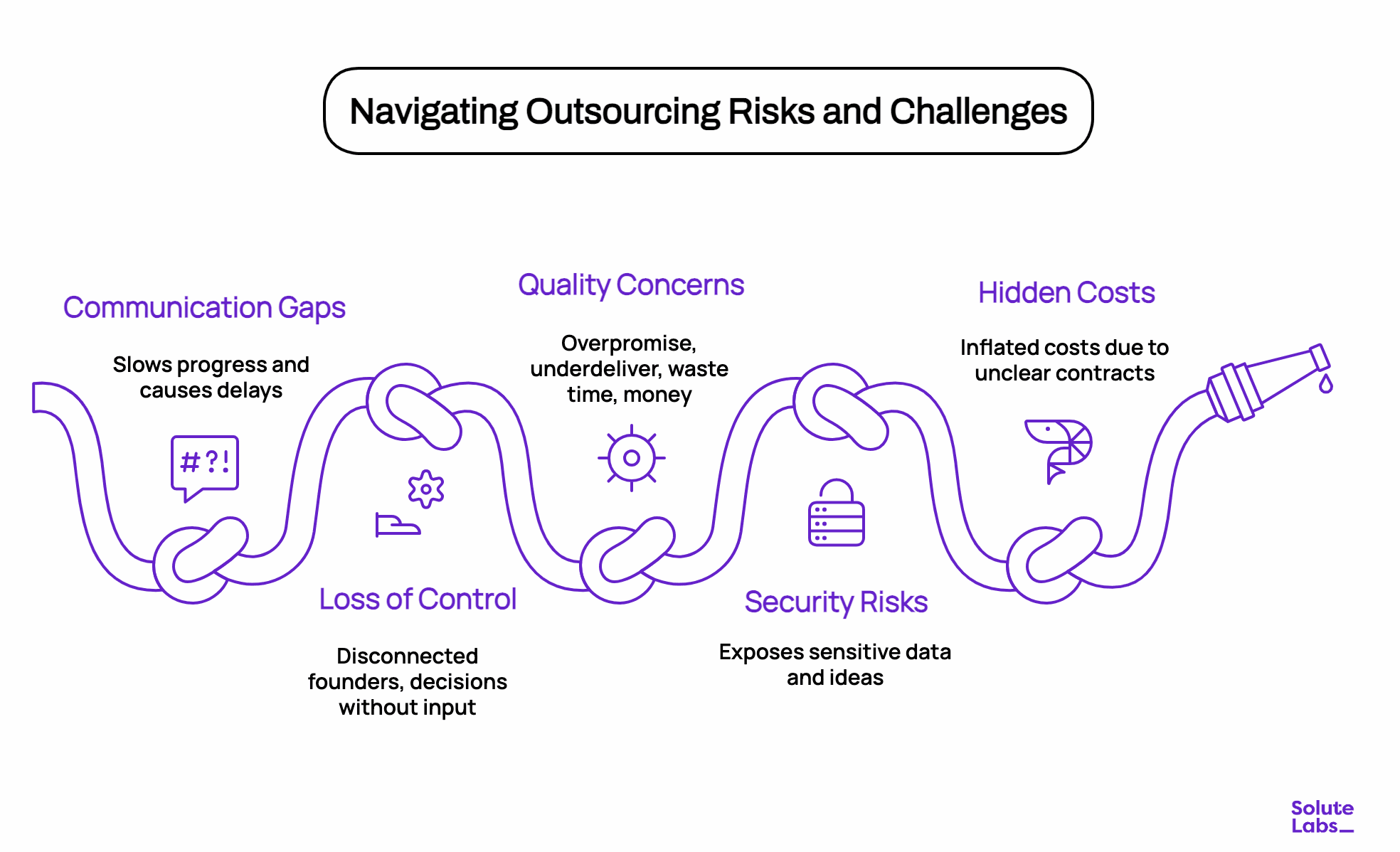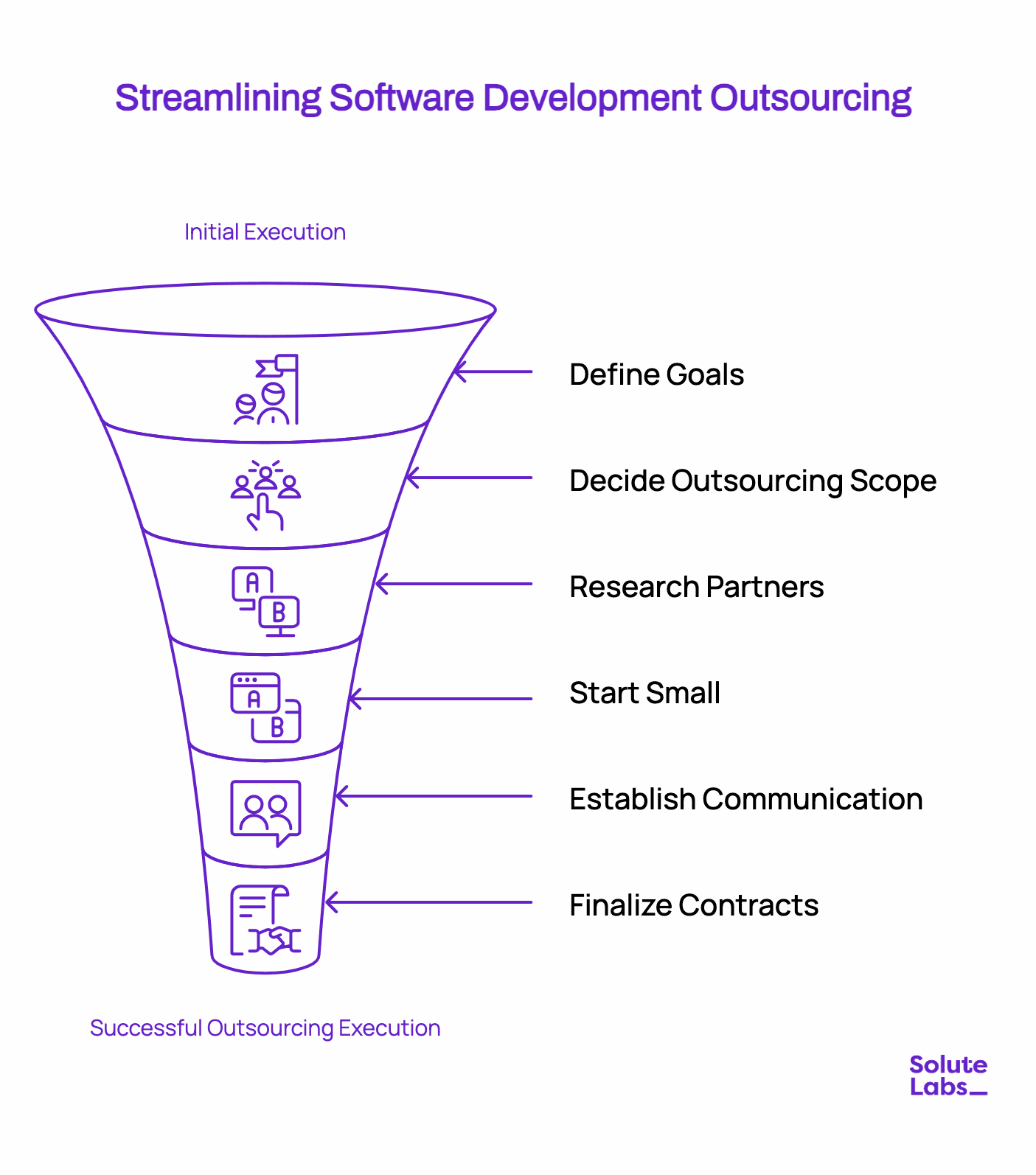Every company founder has to answer the same question: Should we make our product ourselves or hire someone else to do it? It seems like an easy choice, yet it can change the whole course of a small firm. For most companies, software isn't just code on a screen; it's the heart of the business. The way software is made can determine how quickly a business grows or even if it survives at all, whether it's a mobile app, a marketplace, or a SaaS product.
Consider this: the global IT outsourcing market is projected to reach $512.5 billion in 2024. A huge part of that comes from startups. Why? Because founders are often under immense pressure to deliver fast, with limited money, and outsourcing gives them a way to do both. Think about WhatsApp in its early days—it relied on developers in Eastern Europe to keep costs down while scaling quickly. Today it’s a household name, but at the time, outsourcing was one of the reasons it could grow so lean.
The debate about outsourcing is not just financial. It’s about trade-offs: speed versus control, cost versus culture, flexibility versus ownership. There is no universal answer. Some startups thrive with outsourcing, while others regret it and move development in-house later. What matters is understanding the benefits, the risks, and whether outsourcing aligns with the stage your company is in right now.
Overview of Startup Software Development
Startups are built on ideas, but ideas don’t become companies without execution. And when it comes to execution, software is often the bottleneck. Founders might sketch wireframes or draft product roadmaps, but turning those into functioning products requires more than enthusiasm. It requires a team.
A typical startup software development team isn’t just one or two programmers. At a minimum, you need:
- Engineers who can code across different platforms.
- A designer to make sure the product is intuitive and not clunky.
- A project manager or someone wearing that hat to keep tasks on track.
- Testers who find bugs before users do.
- In some cases, DevOps specialists to handle deployment and scaling.
Now here’s the reality: most startups can’t afford this full stack of talent. Even hiring one strong developer in the US or Western Europe can cost upwards of $100,000 a year, not including benefits or tools. For a bootstrapped founder, that’s an impossible starting point.
This leads to three common challenges:
- Time Pressure: Startups are racing against competitors. If someone else launches first, the market might be gone.
- Uncertainty: No matter how confident you feel about your idea, you don’t know how customers will respond until you launch. Spending months building an in-house team before testing the idea can be risky.
- Resource Gaps: Many founders are not engineers. They might be from business or marketing backgrounds. That means they either need a technical co-founder or outside help.
This is why outsourcing even becomes part of the conversation. It’s not because startups don’t value in-house teams; it’s because in the very early days, they need a faster, leaner, and often cheaper way to build.
Why Startups Consider Outsourcing?
If you sit down with ten startup founders and ask them about their biggest pain point, at least half will tell you it’s building the product. Not because they don’t have ideas, but because turning an idea into working software takes time, money, and skills they don’t always have. That’s where outsourcing creeps into the picture, not as a shortcut, but as a way to survive.
Think about the typical founder journey. You raise a seed round or maybe bootstrap with your savings. You’re burning through cash every month, hosting, marketing experiments, salaries if you’ve hired anyone. Meanwhile, investors are asking when they can see a prototype. Customers are asking when they can try the product. The pressure builds fast.
At this point, the idea of outsourcing starts to look appealing for a few reasons:
- Funding Stage Constraints: Hiring in places like San Francisco or London isn’t just expensive; it’s borderline impossible for a two-person team with limited funding. Outsourcing offers a way to get skilled people without draining the bank account.
- Need for Speed: In the early days, speed was currency. If you can show an MVP in three months instead of nine, you have something to pitch, something to test, something real. Outsourcing firms usually have ready-to-go teams, which saves months of recruitment headaches.
- Access to Niche Skills: Plenty of great founders come from business, design, or operations backgrounds. That doesn’t make them less capable, but it does mean they need help writing the first line of code. Outsourcing bridges that gap without forcing them to wait for the “perfect” technical co-founder.
- Scalability Without Commitment: A startup might need ten developers today, but only three once the product stabilizes. Outsourcing lets you scale up or down without the emotional and financial baggage of hiring and firing.
- Mental Bandwidth: Founders often underestimate how much time goes into managing a team, onboarding, training, one-on-ones, career paths. Outsourcing lets them sidestep some of that and focus on things that move the business forward: pitching, partnerships, growth.
If you look at it closely, most startups don’t choose outsourcing because they’re lazy or unwilling to build a team. They choose it because, at that moment, it feels like the only way to move fast without crashing financially. It’s a trade-off, but one that many successful companies have made in their early days.
Suggested Read
How Agile and Outsourcing Can Be Better Together?
View Blog
The Benefits of Software Development Outsourcing for Startups
Let’s be honest, when most founders first hear about software development partner outsourcing for startups, their minds jump straight to cost savings. And yes, saving money is one of the strongest reasons, but it’s not the only one. If it were just about cutting costs, outsourcing wouldn’t have become the backbone of some of the most successful startups we know today.
Take Slack, for example. In its early days, Slack didn’t have a polished product or the big Silicon Valley team it has now. They outsourced part of their design work to a Canadian firm, and that decision helped shape the clean, intuitive interface Slack is known for. Or consider Skype; they tapped into developers in Estonia to get their platform off the ground. Both companies are now giants, but in the beginning, outsourcing gave them a chance to move faster than they could have managed alone.
So, what exactly are the benefits of outsourcing software for a startup
1. Cost Efficiency Without Compromise
Building an in-house team is like committing to a full-time mortgage when you only need a short-term rental. With outsourcing, you only pay for what you need, no extra office space, no employee benefits, no hidden overhead. The cost of outsourcing software development in countries like India or Poland is often a fraction of Silicon Valley salaries, while the quality remains high.
2. Speed to Market
Every founder knows that speed is survival. An outsourced team is usually already assembled and ready to go, so you skip the endless cycle of job postings, interviews, and onboarding. For startups racing against competitors, those extra months can be the difference between capturing the market or missing it completely.
3. Access to Specialized Skills
Startups sometimes need expertise in niche areas, blockchain, artificial intelligence, and advanced data analytics. Hiring those skills locally can be impossible, not just because of cost, but because there’s a shortage. Outsourcing opens the door to a global talent pool where those skills are available and tested.
4. Scalability When You Need
Imagine your product goes viral and suddenly thousands of users are signing up every day. You don’t have time to hire a dozen engineers from scratch. With outsourcing, you can scale the team quickly. And just as important, if growth slows down later, you can reduce the team size without painful layoffs.
5. Flexibility in Development Cycles
Startups don’t always need the same intensity year-round. Maybe you’re building an MVP now, then pausing for customer feedback, and ramping up again later. Outsourcing gives you that ebb and flow without long-term payroll commitments.
6. Around-the-Clock Progress
Here’s an underrated benefit. If your outsourcing partner is in a different time zone, your product keeps moving forward even while you sleep. By the time you wake up, there’s fresh progress to review. For a lean startup, that kind of momentum is priceless.
In short, the benefits of outsourcing software development go far beyond money. They give startups speed, flexibility, and breathing room to focus on strategy rather than survival.
The Risks and Challenges of Outsourcing

Of course, outsourcing isn’t all sunshine. For every story about Slack or Skype, there’s a startup that struggled because it jumped in without thinking it through. The risks of outsourcing software are real, and it’s better to face them early than pretend they don’t exist.
- Communication Gaps: Different time zones, different languages, even different work cultures can all slow things down. If you’re not careful, what should take a week can stretch into a month.
- Loss of Control: When the code isn’t being written in-house, founders sometimes feel disconnected. Without strong project management, decisions may be made without your input.
- Quality Concerns: Not every outsourcing firm is created equal. Some overpromise and underdeliver. For startups with limited budgets, one bad choice can waste precious time and money.
- Security Risks: You’re sharing sensitive ideas and customer data. If the vendor doesn’t follow proper security practices, you could end up exposed.
- Hidden Costs: On paper, outsourcing looks cheap. But change requests, overtime, and miscommunication can inflate costs if contracts aren’t clear.
Here’s the thing: these challenges in outsourcing software don’t mean you should avoid it. They just mean you need to be smart about how you approach it.
Key Steps of Outsourcing Software Development for Startups

If you decide to outsource software development, diving in blindly is risky. A few structured steps can save months of frustration:
1. Define Your Goals Clearly
Don’t just say “we need an app.” Be specific, what features matter most, what platforms you’re targeting, and what success looks like.
2. Decide What to Outsource
Some startups outsource the entire build, while others only hand over design, backend, or testing. Know what makes sense for your stage.
3. Research Potential Partners
Look at portfolios, reviews, and case studies. Talk to past clients if you can. The right partner will have proven experience with startup software development.
4. Start With a Small Project or MVP
Test the waters before committing to a long-term contract. A small pilot helps you gauge quality and communication.
5. Set Up Clear Communication Channels
Weekly calls, shared tools like Jira or Trello, and transparent reporting keep everyone aligned.
6. Lockdown Contracts and Security
Protect your IP, outline costs, and agree on delivery timelines. This prevents surprises later.
7. Stay Involved
Outsourcing doesn’t mean disappearing. Founders who check in regularly tend to get better results.
In short, the steps to outsource software development aren’t complicated, but skipping even one of them can create problems later. Careful planning up front usually pays off with smoother execution.
Outsourcing vs. Building In-House: A Quick Comparison
| Factor | Outsourcing Software Development | In-House Software Development |
|---|---|---|
Speed | Teams can start immediately with existing resources. | Hiring and onboarding can take weeks or even months. |
Cost | Lower upfront costs with flexible models (hourly, project-based). | Higher fixed costs: salaries, benefits, equipment, office space. |
Control | Less direct oversight- depends on the partner's transparency. | Full control over processes, decisions, and priorities. |
Expertise | Access to global talent, including niche technologies. | Limited to local hiring pool and budget constraints. |
Scalibility | Easy to team scales up or down as needs change. | Scaling requires new hires, onboarding, and long-term commitments. |
Risk | Potential communication and quality gaps if not managed well. | Lower vendor risk, but high financial risk if hires don’t work out. |
Innovative and Fresh Perspective | Exposure to new ideas, approaches, and diverse problem-solving methods from global teams. | Can sometimes become narrow, limited to internal culture and thinking patterns. |
Why Choose SoluteLabs for the Right Outsource Software Development?
SoluteLabs has worked with multiple startups, helping them turn ideas into scalable products without the overhead of building large in-house teams. Being a perfect experience of a strategic partner for the AI-native niche in startup software development, flexible engagement models, and strong post-launch support, our team focuses on delivering reliable results quickly.
Our approach blends technical expertise with a startup-friendly mindset, making us a trusted partner for founders who want speed, quality, and collaboration.
Conclusion
For many founders, deciding whether to outsource software development or build in-house isn’t black and white. Outsourcing offers startups speed, flexibility, and access to expertise without heavy upfront costs, while in-house teams provide more control and long-term stability.
The right choice depends on your goals, budget, and growth stage, but with a clear strategy and the right partner, outsourcing can be a powerful growth accelerator. So, what are you waiting for? Contact us today!
